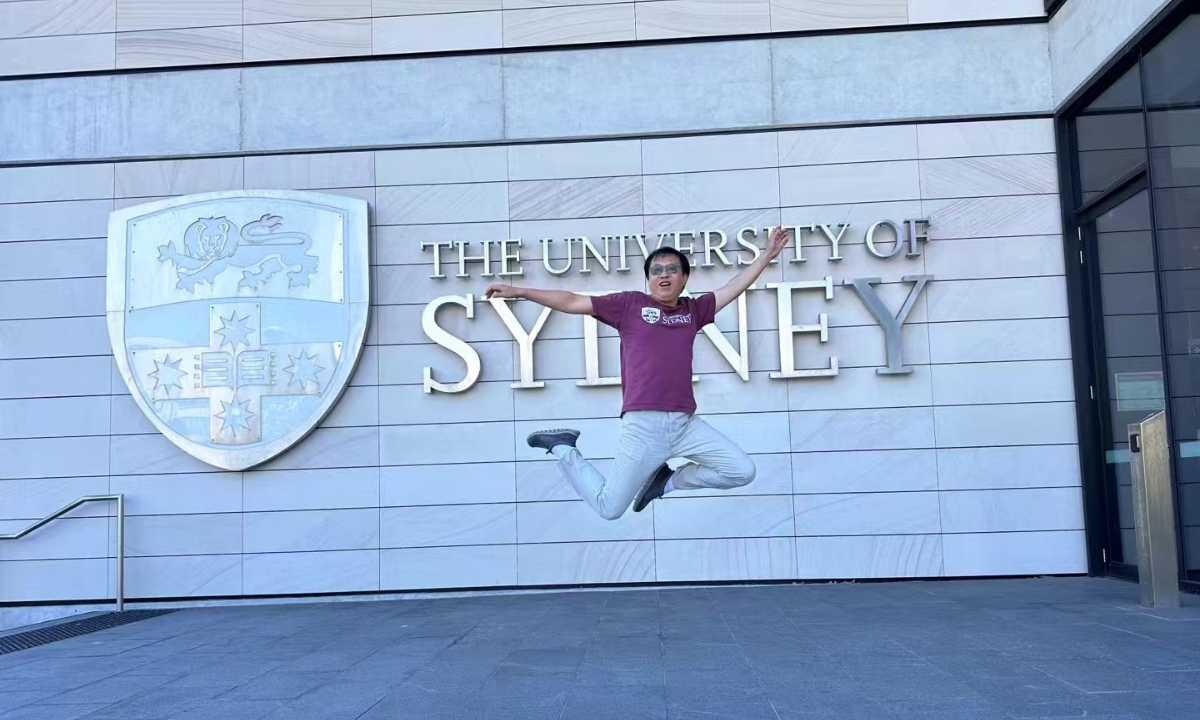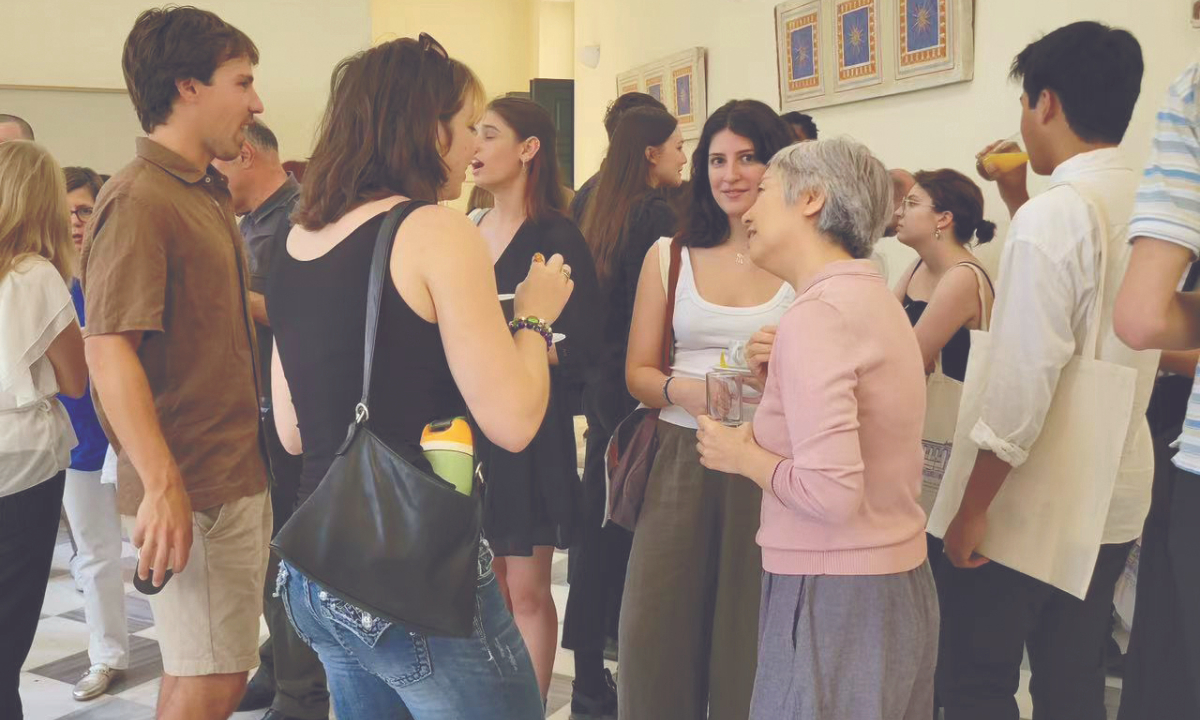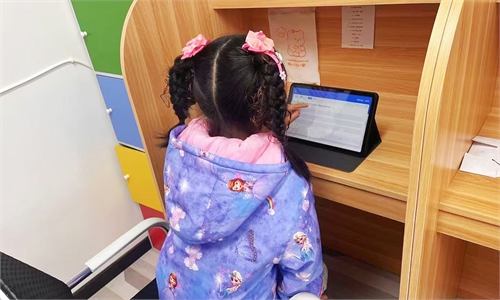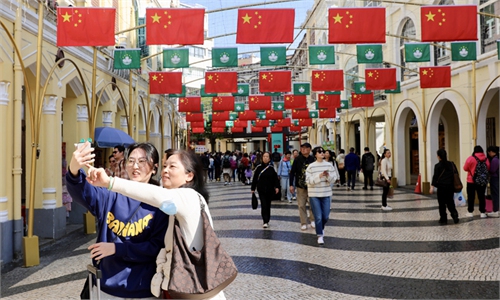
Jia Daming, 50, takes a photo at the University of Sydney. Photo: Courtesy of Jia Daming
As lifelong education has become a trend, China's middle-aged and elderly people are no longer content with the classes provided by domestic institutions for seniors. Instead, they set their sights on broader opportunities abroad. After talking to several elderly people with studying abroad experience, reporters from the Global Times found that the reason most of them decided to study overseas was as they that they had a desire d to explore more possibilities in their lives, and that although studying abroad posed a lot of difficulties for them, they found pleasure in it.

Wang Xiaoxi (second from right), 57, meets her classmates for the first time at orientation at the National and Kapodistrian University of Athens on September 30, 2024. Photo: Courtesy of Wang Xiaoxi
"I shocked myself when I came up with the idea to apply to study abroad. It's quite challenging for me," Wang Xiaoxi, 57, a student majoring in the archaeology, history, and literature of ancient Greece in the National and Kapodistrian University of Athens, told the Global Times. It is an undergraduate program taught entirely in English, with the added course of Modern Greek, Greek and Latin, Wang said.
"Upon applying, I wasn't sure if I would be able to complete the course (at this age), But on second thought, if I don't try, I'll never know," said Wang.
There are increasing number of seniors like Wang in China. Studying overseas is no longer exclusive to teenagers and young adults, it has emerged as a growing trend among the elderly, according to Jiemian News.
According to data from a private education company in China that centered around language learning, educational travel and degree programs, the proportion of individuals aged above 50 participating in overseas study programs in their institution was approximately 3 percent in 2019, but this figure has surged to 20 percent by 2024, the Jiemian News reported.
Popular destinations favored by older adults include New York, Boston, London and Malta, an industry insider told the Global Times.
Fifty is the new twenty-five
Like energetic young people, the elderly possesses the determination to chase their dreams, the courage to embark on new journeys and a curiosity to explore the world.
"In fact, when my parents and some of my friends learned about my plans to study abroad, they were not very supportive. They felt that at my age, there was no need to travel abroad and study," Jia Daming, a 50-year-old man who recently earned a degree of Master of Education from the University of Sydney, told the Global Times. Some of his friends even told him that he was already at the top of his field, and considering the many difficulties and high costs, it wasn't necessary for him to go through with it.
"However, I believe that if I want to maintain a competitive edge in international school education field, it is essential for me to enhance my educational qualifications," Jia said, adding that only through personal experience can one achieve perfection. Therefore, he resolutely embarked on his overseas studying journey in February 2023.
Jia said that at the beginning of the academic year, many of his classmates called him "uncle Jia," but after they became acquainted with each other, they called Jia "bro." Jia mentioned that sometimes while walking down the street or even reading in the library, classmates greet him as if they were peers. He sometimes hanged out with his classmates. For example, he has been to the Great Barrier Reef with them. And some film majors have even invited him to appear as an extra.
However, compared to those in their twenties, elder international students encounter more difficulties and challenges along their courageous journey.
As Wang noted, at any age, you have to be determined to study abroad. However, studying at an older age is even more of a challenge. Even with a good educational background, Wang feels that there are "mountains after mountains to climb" during her studies abroad.
Before the semester started, Wang prepared many electronic devices, such as a voice recorder, an iPad and a Kindle. "As soon as the first week of school started, I was ready to use these devices. But I was fumbling with which buttons to press to turn them on and lower the volume," said Wang, adding that "I can only type with two fingers, and I can't type fast enough to keep up with the professor's speaking pace."
Wang said that when she looked around at her classmates, they were all typing quickly on their laptops. She was the only one writing with a pen.
"It's all Greek to me," Wang described her first two weeks of school, saying that her teacher has quite a thick Greek accent that she could not understand even with the tape recorder, and once she did not even know that her teacher was giving a quiz in class, so she was not prepared.
On that test, Wang only scored 40 points and was "criticized" by her daughter.
"I quickly turned my sorrow into motivation for learning. After class, I copied, translated, understood and memorized every word of the professor's lecture slides. Although it required a lot of effort, the results were quite rewarding," Wang said.
Later on, Wang scored 92 points in her archaeology class test.
Go for it, enjoy it
Wang said that studying abroad is a natural progression for her, as she has always been self-educated and she has always studied whatever she was interested in. "I noticed that the course is taught in English. I realized that I must seize this opportunity to learn English," said Wang, noting that she has always worked hard and embraced new challenges in life.
Since she has been studying abroad, Wang has felt that each day is fulfilling and she always lives in the moment. Wang said she walks to school these days, basking in the sunshine and recounting how she also walked to school as a child. But back then she had a completely different mindset.
She feels grounded, taking one step at a time, and genuinely believes that she has a bright future.
"For me, studying abroad at this age marks the beginning of the 'middle-aged woman' era. The most exciting phase of a woman's life is no longer the traditionally emphasized years of 16 to 25, but rather a woman's entire life is filled with infinite possibilities," said Du Liping, a Chinese woman in her fifties, who kicked off a journey to learn French in Paris a few months ago.
Du told the Global Times that starting her study journey made her feel as though she had suddenly returned to her twenties, but not the impoverished version of her twenties.
Du also mentioned that she never imagined she would have the opportunity to study abroad in her fifties, which makes her feel unique and surrounded by love.
Instead, it felt more like the twenties of a luckier girl, with more life experience.
"My life is extremely rewarding," Du told the Global Times.



